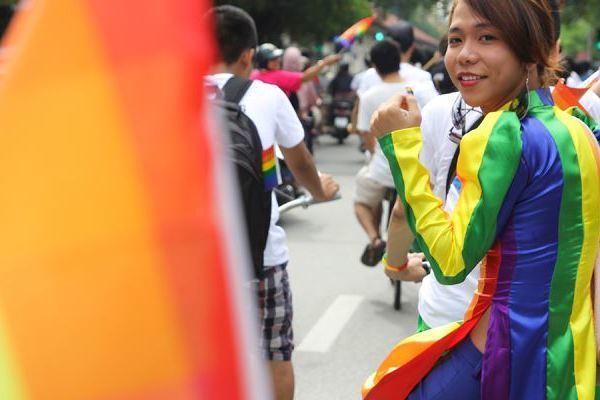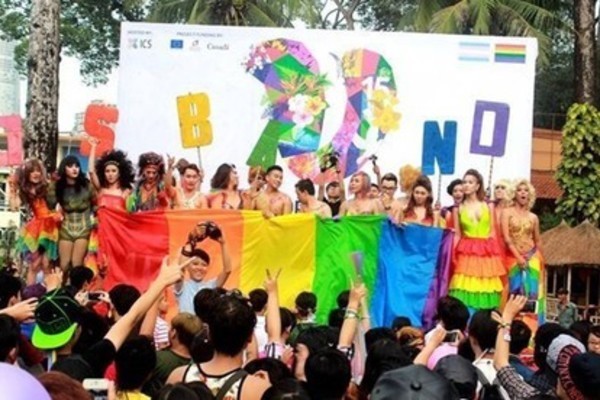 |
|
Gender change is still a very new and sensitive issue in Vietnam. Illustrative image
|
The increasing number of articles, films, positive and fair information about the LGBT community has helped neutralize prejudices and change negative concepts, thereby reducing stigma and discrimination against LGBT people.
Equality and non-discrimination is one of the basic principles of Vietnamese law as well as in international conventions to which Vietnam is a party.
It is observed that although the rights of lesbian, gay, bisexual, and transgender (LGBT) people are gradually guaranteed by the law, they always carry the "permanent" worries: whether after the law is enacted, does it really come to life?
In fact, sex change is still a new and sensitive issue in Vietnam.
According to a survey by the Institute for Studies of Society, Economics and Environment (iSEE), there are three places - family, school and workplace – listed as the environments where the discrimination against LGBT people is the most severe.
The gestures and hairstyles are also the factors that make LGBT people be discriminated and put the most pressure on them. More than half of the survey respondents said they were bullied by their friends, and nearly a quarter said they were harassed and bullied by teachers and school officials because they were considered the LGBT.
Nearly 30% of them were denied from employment because they were the LGBT. In particular, the proportion of transgender people who were refused from getting a job is up to 59.0%, three times higher than that of gay and bisexual people (19.6%). Transgender people are also discriminated against in paying salaries or promotions so most of them held only low-level, basic positions.
Not only that, one in four LGBT people heard and saw negative comments and actions from health workers.
At the public spaces, the proportion of LGBT people who experienced discrimination is higher: toilets (28.7%), changing rooms, bathrooms (25.0%), entertainment venues ( 24.4%), shopping places (23.9%) or restaurants, cafes (21.9%).
The especially important role of the media
 |
|
The increasing number of articles, films, positive and fair information about the LGBT community has helped neutralize prejudices and change negative concepts, thereby reducing stigma and discrimination against LGBT people.
|
Since the Law on Marriage and Family 2014 removed the prohibition and punishment of same-sex marriage, although it does not recognize same-sex marriage, the 2015 Civil Code (amended) legalizes transgender transition, the society has had many positive changes in discussing and protecting the rights of the LGBT community.
The media has worked well on raising the awareness of the Vietnamese society on discrimination against LGBT people. The increasing number of articles, films, positive and fair information about the LGBT community has helped neutralize prejudices and change negative concepts, thereby reducing stigma and discrimination against LGBT people.
In an interview, Le Quang Binh, former head of the Institute of Social, Economic and Environmental Research, said: “The media plays an important and pioneering role in eliminating prejudices of society towards homosexuals. The truthful, accurate and objective information about homosexuals on the media will help the community to know and better understand homosexuals, help them feel secure to live, study, and actively contribute to building the society”.
Mr. Binh cited, for a long time, on the big and small screens, homosexual characters in Vietnamese films about the LGBT community are built similarly: taking mincing steps, uneducated, having an "on the sidelines" live and full of complex.
Recently, the movie "Love, Simon" (directed by Greg Berlanti) was screened in Vietnam and it was highly praised by the LGBT community. "Love, Simon" was highly appreciated by the LGBT community in Vietnam because it is different from all the other movies on this topic so far. Homosexual love is already tragic, but "Love, Simon" chooses to have a happy ending. The teenage homosexual love story is rated by Hollywood critics "as a warm sunshine that helps to relieve stress and pressure, and opens a new door, new horizon for the LGBT community who are still striving for equality and happiness”.
Given these evidence to show that, besides being protected by the legal corridor, what the LGBT community needs more now is the relay of the media, in order to enhance the right information to reduce the complex, the prejudices about them that have persisted for a long time in the society.
Hoa Binh
 Equality and non-discrimination is one of the basic principles of Vietnamese law as well as in international conventions to which Vietnam is a party.
Equality and non-discrimination is one of the basic principles of Vietnamese law as well as in international conventions to which Vietnam is a party.